

Uk.businessinsider. The Punctuation Guide. The Lonely Island - SEMICOLON (feat. Solange) LYRICS VIDEO #WACKWEDNESDAYS. A Brief History of the Hashtag, and Other Unusual Punctuation Marks. In his new book, “Shady Characters: The Secret Life of Punctuation, Symbols & Other Typographical Marks,” Keith Houston reveals the stories behind esoteric punctuation marks, from the pilcrow (¶) to the manicule (☞) to the octothorpe, a.k.a. the hashtag.
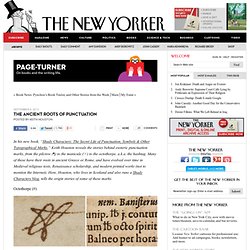
Many of these have their roots in ancient Greece or Rome, and have evolved over time in Medieval religious texts, Renaissance scholarship, and modern printed works (not to mention the Internet). Here, Houston, who lives in Scotland and also runs a Shady Characters blog, tells the origin stories of some of these marks. Octothorpe (#) Left, from the pen of Isaac Newton; right, detail from Johann Conrad Barchusen’s “Pyrosophia” (1698). Courtesy the Othmer Library of Chemical History, Chemical Heritage Foundation. The story of the hashtag begins sometime around the fourteenth century, with the introduction of the Latin abbreviation “lb,” for the Roman term libra pondo, or “pound weight.” Pilcrow (¶) Ampersand (&) Manicule (☞) Diple (>)
Rules for Comma Usage. Use a comma to separate the elements in a series (three or more things), including the last two.
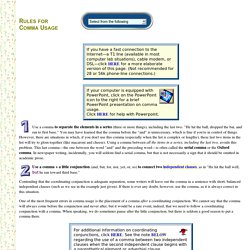
"He hit the ball, dropped the bat, and ran to first base. " You may have learned that the comma before the "and" is unnecessary, which is fine if you're in control of things. However, there are situations in which, if you don't use this comma (especially when the list is complex or lengthy), these last two items in the list will try to glom together (like macaroni and cheese). Comma history. “Put a comma in whenever you take a breath.”
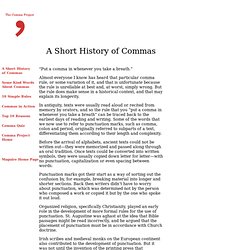
Almost everyone I know has heard that particular comma rule, or some variation of it, and that is unfortunate because the rule is unreliable at best and, at worst, simply wrong. But the rule does make sense in a historical context, and that may explain its longevity. In antiquity, texts were usually read aloud or recited from memory by orators, and so the rule that you “put a comma in whenever you take a breath” can be traced back to the earliest days of reading and writing.
Some of the words that we now use to refer to punctuation marks, such as comma, colon and period, originally referred to subparts of a text, differentiating them according to their length and complexity. Before the arrival of alphabets, ancient texts could not be written out—they were memorized and passed along through an oral tradition.
The Most Comma Mistakes. Draft is a series about the art and craft of writing.
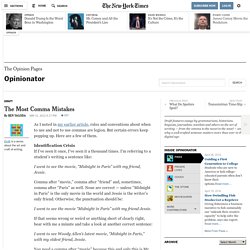
As I noted in my earlier article, rules and conventions about when to use and not to use commas are legion. But certain errors keep popping up. Here are a few of them. Identification Crisis If I’ve seen it once, I’ve seen it a thousand times. I’m referring to a student’s writing a sentence like: I went to see the movie, “Midnight in Paris” with my friend, Jessie. Comma after “movie,” comma after “friend” and, sometimes, comma after “Paris” as well. I went to see the movie “Midnight in Paris” with my friend Jessie. If that seems wrong or weird or anything short of clearly right, bear with me a minute and take a look at another correct sentence: I went to see Woody Allen’s latest movie, “Midnight in Paris,” with my oldest friend, Jessie.
You need a comma after “movie” because this and only this is Mr. The syntactical situation I’m talking about is identifier-name. Grammatically, there are various ways of describing what’s going on. Www.uncg.edu/eng/writingcenter/handouts/COMMAS.pdf. Dashes Versus Colons. Last week when I was speaking at the Field's End Writers Conference on Bainbridge Island, someone in the audience asked about dashes.
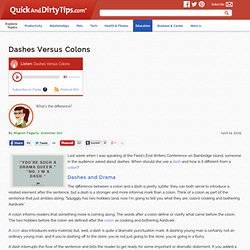
When should she use a dash and how is it different from a colon? Dashes and Drama The difference between a colon and a dash is pretty subtle: they can both serve to introduce a related element after the sentence, but a dash is a stronger and more informal mark than a colon. Think of a colon as part of the sentence that just ambles along. "Squiggly has two hobbies [and, now I'm going to tell you what they are, colon] cooking and bothering Aardvark. " A colon informs readers that something more is coming along. How to Use a Dash in an English Sentence: 2 Methods. Edit Article Dash Usage HintsUsing a DashExamples Edited by BangDROP, Julia Maureen, Bo, Dlpn and 52 others Do you use a dash a lot?
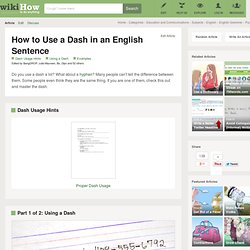
What about a hyphen? Many people can't tell the difference between them. Ad Steps Part 1 of 2: Using a Dash 1Know the kinds of dashes. Part 2 of 2: Examples.